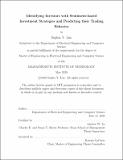| dc.contributor.advisor | Andrew W. Lo. | en_US |
| dc.contributor.author | Luo, Sophia Y.M. Eng.Massachusetts Institute of Technology. | en_US |
| dc.contributor.other | Massachusetts Institute of Technology. Department of Electrical Engineering and Computer Science. | en_US |
| dc.date.accessioned | 2020-09-15T21:59:39Z | |
| dc.date.available | 2020-09-15T21:59:39Z | |
| dc.date.copyright | 2020 | en_US |
| dc.date.issued | 2020 | en_US |
| dc.identifier.uri | https://hdl.handle.net/1721.1/127475 | |
| dc.description | Thesis: M. Eng., Massachusetts Institute of Technology, Department of Electrical Engineering and Computer Science, May, 2020 | en_US |
| dc.description | Cataloged from the official PDF of thesis. | en_US |
| dc.description | Includes bibliographical references (pages 117-119). | en_US |
| dc.description.abstract | To the best of our knowledge, there are no algorithms that distinguish different types of investors or predict how investors react to market or non-market events. In this study, we develop a computational approach to investigate investors with sentiment-based investment strategies and predict their trading behavior. We combine a dataset of more than 600,000 brokerage accounts from 2003-2015 with the RavenPack News Analytics dataset. Then, we construct a novel sentiment investor identification mechanism to classify sentiment and non-sentiment investors. Finally, we derive three machine learning models to predict whether a sentiment investor will react to a sentiment event, the reaction magnitude, and the direction of reaction (i.e. buy vs. sell). We select models that are easily interpretable and thus more directly applicable in realworld financial applications. We find that being married and the fraction of positive events in the seven days prior to an event have negative effects on the probability of reaction; whereas, occurring before the financial crisis has a positive effect. On the other hand, the sentiment event with the largest magnitude a week prior to an event and previous sentiment trading behavior have positive effects on reaction magnitude. Finally, being married and previous sentiment trading behavior have negative effects on the probability of buying versus selling, but occurring before the financial crisis has a positive effect. | en_US |
| dc.description.statementofresponsibility | by Sophia Y. Luo. | en_US |
| dc.format.extent | 119 pages | en_US |
| dc.language.iso | eng | en_US |
| dc.publisher | Massachusetts Institute of Technology | en_US |
| dc.rights | MIT theses may be protected by copyright. Please reuse MIT thesis content according to the MIT Libraries Permissions Policy, which is available through the URL provided. | en_US |
| dc.rights.uri | http://dspace.mit.edu/handle/1721.1/7582 | en_US |
| dc.subject | Electrical Engineering and Computer Science. | en_US |
| dc.title | Identifying investors with sentiment-based investment strategies and predicting their trading | en_US |
| dc.type | Thesis | en_US |
| dc.description.degree | M. Eng. | en_US |
| dc.contributor.department | Massachusetts Institute of Technology. Department of Electrical Engineering and Computer Science | en_US |
| dc.identifier.oclc | 1193019642 | en_US |
| dc.description.collection | M.Eng. Massachusetts Institute of Technology, Department of Electrical Engineering and Computer Science | en_US |
| dspace.imported | 2020-09-15T21:59:38Z | en_US |
| mit.thesis.degree | Master | en_US |
| mit.thesis.department | EECS | en_US |
